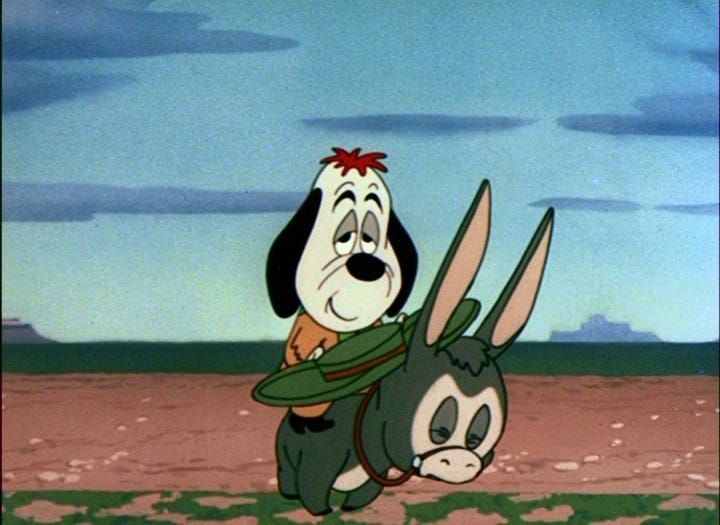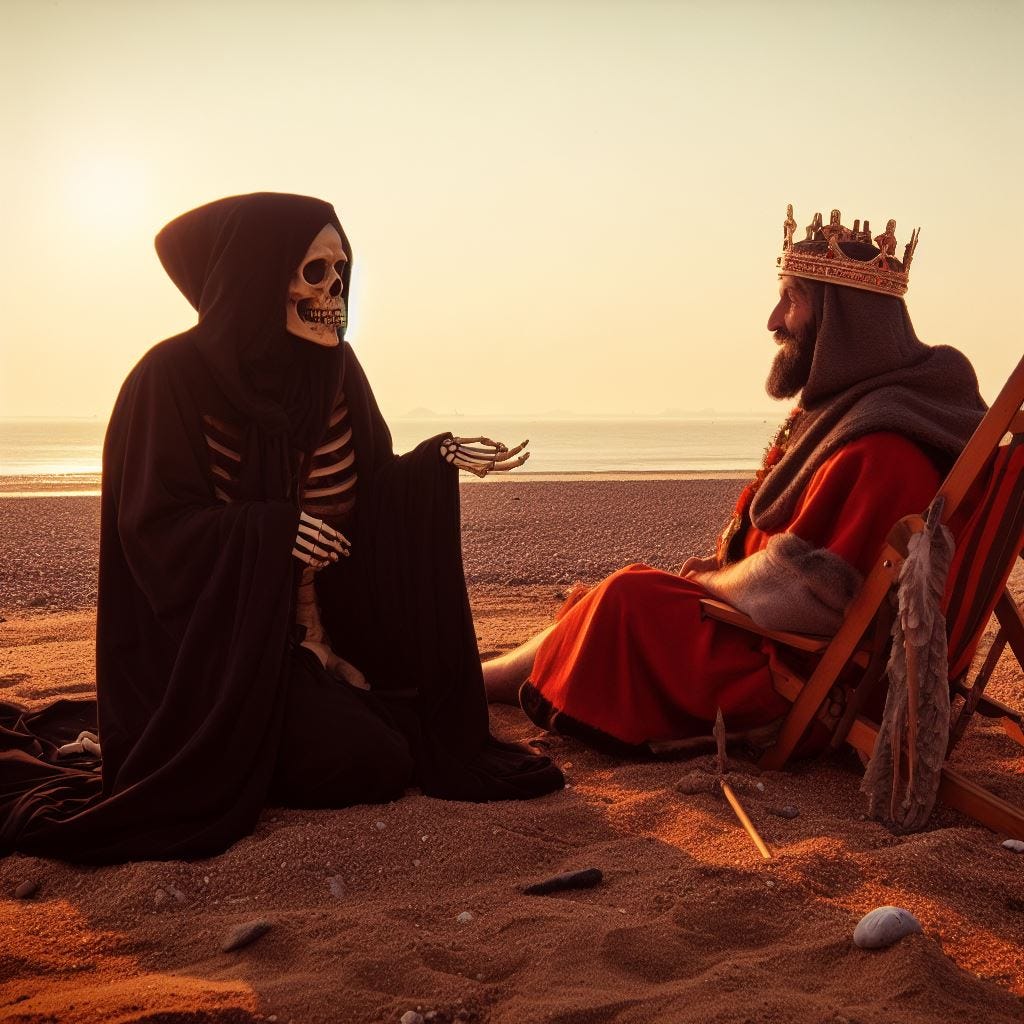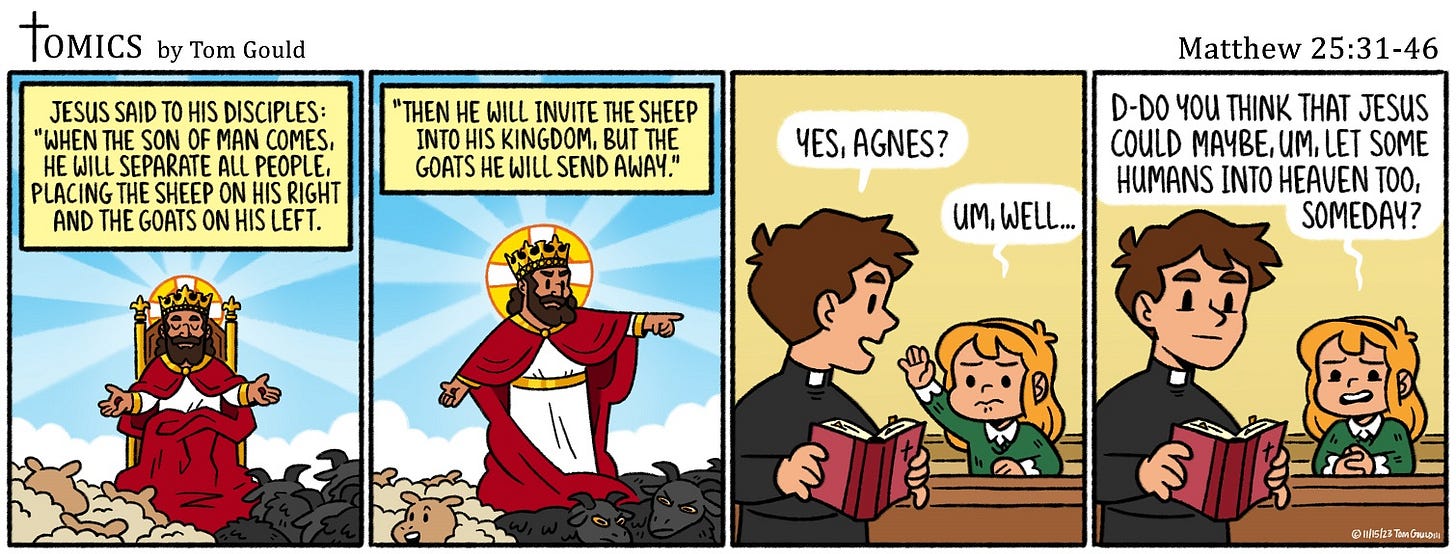As I’m writing this on the 25th, today marks one year since I started The Amateur Theologian! Because the secular calendar and the Church calendar don’t quite line up, today’s readings are a week off from last year.1
I don’t know that I have anything particular to say about this other than to note the title of yesterday’s post was It’s a Matter of Time, and almost exactly a year ago, I titled the first Sunday of Advent It’s About Time. I gotta work on my titles.
Reading 1
Ez 34:11-12, 15-17
Thus says the Lord GOD: I myself will look after and tend my sheep. As a shepherd tends his flock when he finds himself among his scattered sheep, so will I tend my sheep. I will rescue them from every place where they were scattered when it was cloudy and dark. I myself will pasture my sheep; I myself will give them rest, says the Lord GOD. The lost I will seek out, the strayed I will bring back, the injured I will bind up, the sick I will heal, but the sleek and the strong I will destroy, shepherding them rightly.
As for you, my sheep, says the Lord GOD, I will judge between one sheep and another, between rams and goats.
A shepherd is kind of a working-class gig. There aren’t a whole lot of rich shepherds out there.
So why would the all-mighty God identify as one? Well, today’s is the Feast of Christ the King, and, well, that’s a step down, too, isn’t it? Jesus is the King of Kings. He is one person of the Holy Trinity.
And yet, He deigned to humble Himself and become a human (which is what we really celebrate on Christmas). It’s all humble, to God. And that just shows how much He loves us!
Responsorial Psalm
Ps 23:1-2, 2-3, 5-6
R. The Lord is my shepherd; there is nothing I shall want.
The LORD is my shepherd; I shall not want.
In verdant pastures he gives me repose.
R. The Lord is my shepherd; there is nothing I shall want.
Beside restful waters he leads me;
he refreshes my soul.
He guides me in right paths
for his name's sake.
R. The Lord is my shepherd; there is nothing I shall want.
You spread the table before me
in the sight of my foes;
you anoint my head with oil;
my cup overflows.
R. The Lord is my shepherd; there is nothing I shall want.
Only goodness and kindness follow me
all the days of my life;
and I shall dwell in the house of the LORD
for years to come.
R. The Lord is my shepherd; there is nothing I shall want.
The “good shepherd” metaphor is used in both the Old and New Testaments. A sheep doesn’t, and can’t, fully understand a shepherd, but feels his love and care all the same.
Reading 2
1 Cor 15:20-26, 28
Brothers and sisters: Christ has been raised from the dead, the firstfruits of those who have fallen asleep. For since death came through man, the resurrection of the dead came also through man. For just as in Adam all die, so too in Christ shall all be brought to life, but each one in proper order: Christ the firstfruits; then, at his coming, those who belong to Christ; then comes the end, when he hands over the kingdom to his God and Father, when he has destroyed every sovereignty and every authority and power. For he must reign until he has put all his enemies under his feet. The last enemy to be destroyed is death. When everything is subjected to him, then the Son himself will also be subjected to the one who subjected everything to him, so that God may be all in all.
No Earthly king comes close to the sovereignty of Jesus. Even the most powerful king has no authority over death.
Alleluia
Mk 11:9, 10
R. Alleluia, alleluia.
Blessed is he who comes in the name of the Lord!
Blessed is the kingdom of our father David that is to come!
R. Alleluia, alleluia.
This is sung as Jesus enters Jerusalem, but the greeting stops short of proclaiming him Messiah. His work isn’t completed, yet.
Gospel
Mt 25:31-46
Jesus said to his disciples: "When the Son of Man comes in his glory, and all the angels with him, he will sit upon his glorious throne, and all the nations will be assembled before him. And he will separate them one from another, as a shepherd separates the sheep from the goats. He will place the sheep on his right and the goats on his left.
Then the king will say to those on his right, 'Come, you who are blessed by my Father. Inherit the kingdom prepared for you from the foundation of the world. For I was hungry and you gave me food, I was thirsty and you gave me drink, a stranger and you welcomed me, naked and you clothed me, ill and you cared for me, in prison and you visited me.'
Then the righteous will answer him and say, 'Lord, when did we see you hungry and feed you, or thirsty and give you drink? When did we see you a stranger and welcome you, or naked and clothe you? When did we see you ill or in prison, and visit you?'
And the king will say to them in reply, 'Amen, I say to you, whatever you did for one of the least brothers of mine, you did for me.'
Then he will say to those on his left, 'Depart from me, you accursed, into the eternal fire prepared for the devil and his angels. For I was hungry and you gave me no food, I was thirsty and you gave me no drink, a stranger and you gave me no welcome, naked and you gave me no clothing, ill and in prison, and you did not care for me.'
Then they will answer and say, 'Lord, when did we see you hungry or thirsty or a stranger or naked or ill or in prison, and not minister to your needs?'
He will answer them, 'Amen, I say to you, what you did not do for one of these least ones, you did not do for me.'
And these will go off to eternal punishment, but the righteous to eternal life."
There was a show a few years ago called The Good Place. It’s a kind of secular version of Christianity—culturally Christian, if you will. The show was very funny, and I recommend the first couple of seasons. But as the series goes on, the cracks in its eschatology start to appear.
The short version is, an extra-universal judge counts up your every good and bad deed. If the good outweighs the bad, you go “the good place” (i.e. non-denominational heaven); if not, you go to “the bad place.” The problems with this, both as a theology and as a parody of true Christian beliefs, are twofold—one, there is no opportunity for forgiveness or grace.2
Second, and related to today’s Gospel, are what economists would call “externalities.” Things that are a result of our actions, but not necessarily our intentions. In The Good Place (the show), negative externalities are counted against you—buying electronics built by slave labor, using fossil fuels that contribute to climate change, etc.3
At no point in the 53 episodes of the series does anyone bring up positive externalities. The good that we do accidentally, inadvertently, or as a result of the social and cultural norms we’ve built.
As with the forgiveness, the series creators get it wrong here, too. Jesus clearly tells us that the good that we do is seen by the King of the Universe, even if we ourselves don’t see it. Our kindness and generosity does not go unnoticed.
Because even though He is the all-powerful creator of the world, He was also once a little baby, small and helpless. A child learning to run and jump and play, think and talk and pray. A laborer just doing His job, supporting His family through honest work.
He’s not just the Messiah, son of David; Jesus is also a regular dude, who understands how hard regular life is. He knows we’re doing our best, and He accepts our offering of ourselves and all the good we do, knowingly and unknowingly.
So, bow and give praise, as that is His due. But also accept the hug He gives us and return it, because that is also His due.
In fact, last year was the earliest Advent can start (November 27), and this year, it’s the latest (December 3). On the secular calendar, Thanksgiving 2023 is almost as early as it can be. (The earliest possible Thanksgiving is November 22nd, which won’t happen until 2029, due to leap years.)
Anyway, the gap between the two is kinda weird, and it’s why we put the Christmas tree up but not the Advent candles.
Notice I referred to the character as a “judge,” not God, because there is no mercy in The Good Place’s worldview.
As to negative externalities due to sexual behavior, don’t worry—this is an American network show, so there is absolutely no consideration of sexual morality beyond “consent.”






